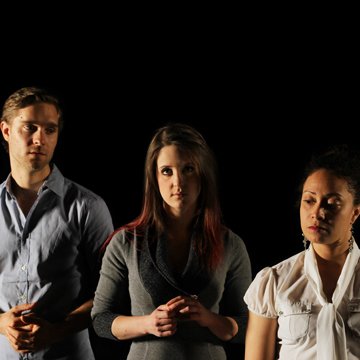Apophis

Any event that shows at the Cultch’s Historic Theatre is automatically under pressure to be amazing and live up to the expectations of being intellectual, classy, and well-organized. The venue, one of East Vancouver’s most prestigious and well-respected performance spaces, is elegant and has beautiful acoustics.
Intellectual drama Apophis puts good effort into meeting these expectations, but drags on a smidge too long for comfort.
Apophis’ script focuses on dialogue rather than action. The conflict is a push-pull dynamic between three young adults who argue about which of them are going to stay put or flee the city in the face of impending global disaster.
Chloe and Ashley are roommates in a downtown apartment; Eric has been invited to join them on their voyage out of the city as they seek sanctuary at Chloe’s father’s rural home.
The show opens right up into conflict and tension: the three are nearly ready to leave the apartment forever, but then Ashley hesitates and protests, reconsidering.
Ashley is pragmatic, unsentimental, preferring to experience the once-in-a-lifetime doomsday up close rather than fleeing the city in hopes of postponing death by a day or two. Eric is methodical, using the process of “a series of steps” plan the next few days and thus avoid thinking about what lies thereafter. Chloe is resolved, allowing her faith and belief in a higher power to carry her calmly through crisis and uncertainty.
The issues brought up in the trio’s ensuing discussions mirror the millennia-old debate of theology versus science. Also questioned are such philosophical ideas as quality of life versus quantity of life, the nature of love and relationships, and the value of sentimental objects connecting one to home and history.
Nicole Anthony’s Chloe seems quiet and unremarkable -- but it is the subtleties of her facial expressions that bring the character to life. Her true acting ability shines in moments of passion and anger -- her furious voice is passionate enough to make me freeze, and her choked-up near-tears grimace nearly makes me cry.
Kat Liffiton’s Ashley has by far the most dialogue, as she delves most deeply into the philosophical aspects of impending doom. The monologues are rather wordy and rambling, perhaps better suited to written text than to spoken -- Liffiton has a tough task to carry such weighty lines, and at times her monologues do tend to come across as rather stilted and recited.
The character of Eric has the greatest character arc -- at first, he says little, but as he dips into the liquor cabinet to cope with the situation, he opens up and becomes more verbose and philosophical. Considering the amount of straight alcohol the character consumes in a short period, I am surprised that aside from his chattiness he doesn’t appear drunk -- I assume this was a deliberate decision made by director Brett Yanta or actor Jensen Shields, as wobbly footsteps and slurring speech do tend to make for poor entertainment.
Given its emphasis on dialogue, Apophis is a bit ponderous and dragging -- audience members got restless and started shuffling their feet. But for the intellectual types who are able to maintain focus on nonstop talking for an hour, this show is a lovely delving into the philosophies of life and the afterlife.



